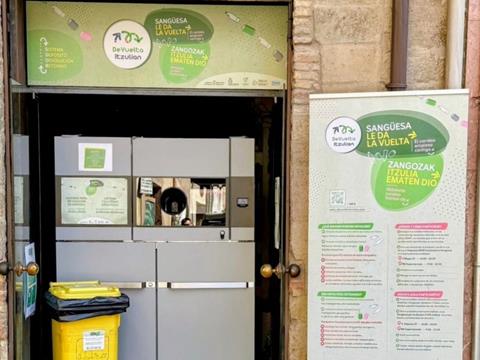
TOMRA has announced the installation of deposit return systems (DRS) machines in the town of Sangüesa, Navarra in Spain, as part of a government trial of DRS for drinks container recycling.
With a country-wide DRS for containers expected to be introduced in November 2026, TOMRA reports that the Sangüesa community has already returned over 150,000 bottles and cans in two months since its launch in June. Led by the Government of Navarra’s Office for Waste Prevention and the Promotion of the Circular Economy (OPREC) in collaboration with the Association of Municipalities of the Sangüesa Region and Sangüesa City Council, the pilot features two TOMRA T70 Dual reverse vending machines.
The machines accept PET bottles and cans and aim to provide an ‘easy-to-use’ and safe solution for container returns. The initiative began on June 1 and will end on August 31, allowing residents to return soft drinks, water, juices, isotonic and energy drinks, as well as beer in cans or plastic bottles of less than three litres.
Eligible drinks have a €0.10 deposit, which is refunded when the container is returned for recycling to a reverse vending machine. TOMRA says over ten local businesses are participating in the pilot, with the insights anticipated to help fine-tune the rollout of DRS technology across Spain.
In related news, Portugal is also set to launch its national DRS scheme for single-use beverage packaging in 2026, with administrated by non-profit SDR Portugal and with waste management company Sensoneo as IT solution provider. Sensoneo’s IT system will power the DRS infrastructure, covering all operational aspects including the take-back system, aiming to ensure efficient tracking, collection processes, and warehouse and transport management.
In May, Aldi Hungary reported that consumers had returned around 140 million items of single-use packaging via in-store REpont machines, equating to a daily average of 3,000+ plastic, aluminium, and glass bottles per store. The retailer says its overall average is more than 3,000 bottles daily, calculating that 58% of the returned bottles are made of PET.
If you liked this story, you might also enjoy:
The ultimate guide to the Packaging and Packaging Waste Regulation in 2025
How are the top brands progressing on packaging sustainability?
Everything you need to know about global packaging sustainability regulation in 2025
The key to increasing the use of reusable packaging in supermarkets


















No comments yet